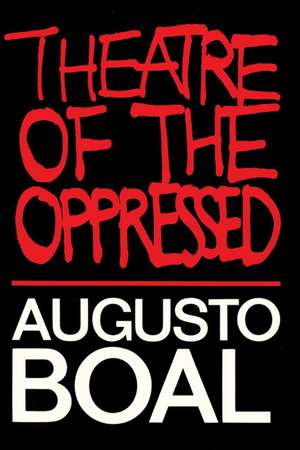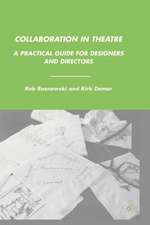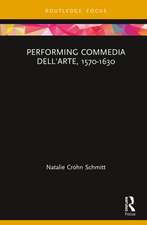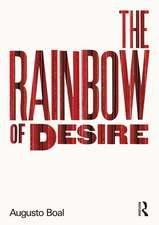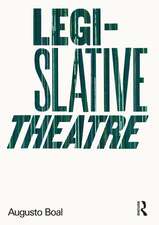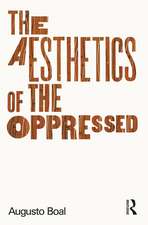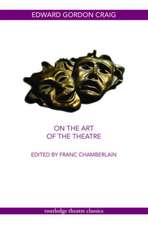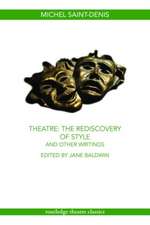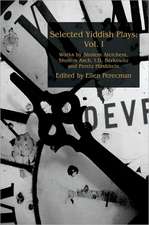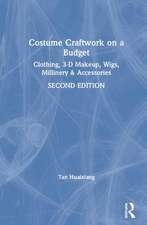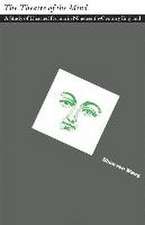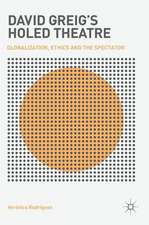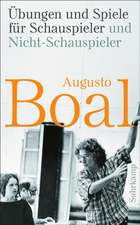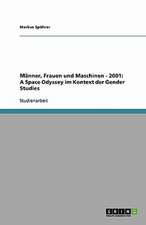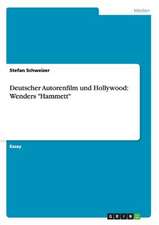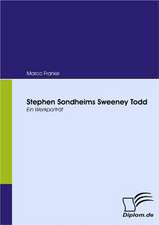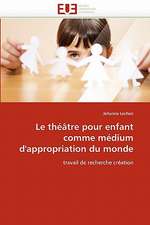Theatre of the Oppressed
Autor Augusto Boal Traducere de Charles A. McBrideen Limba Engleză Paperback – 31 dec 1992
"Boal and his work are marvelous examples of the post-modern situation-its problems and its opportunities. Twice exiled, Boal is 'at home' now wherever he finds himself to be. He makes a skeptical, comic, inquisitive and finally optimistic theatre involving spectators and performers in the search for community and integrity. This is a good book to be used even more than to be read." - Richard Schechner
"Augusto Boal's achievement is so remarkable, so original and so groundbreaking that I have no hesitation in describing the book as the most important theoretical work in the theatre in modern times - a statement I make with having suffered any memory lapse with respect to Stanislavsky, Artaud or Grotowski." - Goerge E. Wellwarth
Originally basing himself at the Arena Stage in Sao Paolo, Brazil, Augusto Boal developed a series of imaginative theatre exercises which promote awareness of one's social situation and its limitations, individual attitudes, and even how our bodies are bound by tradition. Boal is continued his explorations in Paris, where he directed Le CEDITADE (Centre d'Etude et de Diffusion des Techniques Actives d'Expression - Methode Boal), in addition to traveling and lecturing extensively in other countries. On May 2, 2009, Boal died at age 78 in Rio de Janeiro.
"Augusto Boal's achievement is so remarkable, so original and so groundbreaking that I have no hesitation in describing the book as the most important theoretical work in the theatre in modern times - a statement I make with having suffered any memory lapse with respect to Stanislavsky, Artaud or Grotowski." - Goerge E. Wellwarth
Originally basing himself at the Arena Stage in Sao Paolo, Brazil, Augusto Boal developed a series of imaginative theatre exercises which promote awareness of one's social situation and its limitations, individual attitudes, and even how our bodies are bound by tradition. Boal is continued his explorations in Paris, where he directed Le CEDITADE (Centre d'Etude et de Diffusion des Techniques Actives d'Expression - Methode Boal), in addition to traveling and lecturing extensively in other countries. On May 2, 2009, Boal died at age 78 in Rio de Janeiro.
| Toate formatele și edițiile | Preț | Express |
|---|---|---|
| Paperback (2) | 98.54 lei 3-5 săpt. | |
| Theatre Communications Group – 31 dec 1992 | 98.54 lei 3-5 săpt. | |
| PLUTO PRESS – 19 mar 2019 | 135.23 lei 3-5 săpt. | +24.04 lei 4-10 zile |
| Hardback (1) | 591.71 lei 3-5 săpt. | +19.37 lei 4-10 zile |
| PLUTO PRESS – 19 mar 2019 | 591.71 lei 3-5 săpt. | +19.37 lei 4-10 zile |
Preț: 98.54 lei
Nou
Puncte Express: 148
Preț estimativ în valută:
18.85€ • 19.69$ • 15.57£
18.85€ • 19.69$ • 15.57£
Carte disponibilă
Livrare economică 25 martie-08 aprilie
Preluare comenzi: 021 569.72.76
Specificații
ISBN-13: 9780930452490
ISBN-10: 0930452496
Pagini: 208
Dimensiuni: 137 x 215 x 14 mm
Greutate: 0.3 kg
Ediția:Tcg
Editura: Theatre Communications Group
Colecția Theatre Communications Group
ISBN-10: 0930452496
Pagini: 208
Dimensiuni: 137 x 215 x 14 mm
Greutate: 0.3 kg
Ediția:Tcg
Editura: Theatre Communications Group
Colecția Theatre Communications Group
Notă biografică
Augusto Boal (1931-2009) was a Brazilian theatre practitioner, drama theorist and political activist. He is the author of Theatre of the Oppressed (Pluto Press, 2019).
Cuprins
Preface to the 2008 edition
Preface to the 2000 edition ¿ The Unruly Protagonist
Preface to the 1974 edition
1. Aristotle¿s Coercive System of Tragedy
Introduction
Art Imitates Nature
What is the Meaning of `Imitation¿?
What, then, is the Purpose of Art and Science?
Major Arts and Minor Arts
What does Tragedy Imitate?
What is Happiness?
And What is Virtue?
Necessary Characteristics of Virtue
The Degrees of Virtue
What is Justice?
In What Sense can Theatre Function as an Instrument for Purifi cation and Intimidation?
The Ultimate Aim of Tragedy
A Short Glossary of Simple Words
How Aristotle¿s Coercive System of Tragedy Functions
Different Types of Confl ict: Hamartia and Social Ethos
Conclusion
2. Machiavelli and the Poetics of Virtù
The Feudal Abstraction
The Bourgeois Concretion
Machiavelli and Mandragola
Modern Reductions of Virtù
3. Hegel and Brecht: The Character as Subject or the Character as Object?
The `Epic¿ Concept
Types of Poetry in Hegel
Characteristics of Dramatic Poetry, Still According to Hegel
Freedom of the Character-Subject
A Word Poorly Chosen
Does Thought Determine Being (or Vice Versa)?
Can Man be Changed?
Confl ict of Wills or Contradiction of Needs?
Empathy or What? Emotion or Reason?
Catharsis and Repose, or Knowledge and Action?
How to Interpret the New Works?
The Rest Does Not Count: They Are Minor Formal Differences Between the Three Genres
Empathy or Osmosis
4. Poetics of the Oppressed
Experiments with the People¿s Theatre in Peru
Conclusion: `Spectator¿, a Bad Word!
5. Development of the Arena Theatre of São Paulo
Need for the `Joker¿
Goals of the `Joker¿
Structures of the `Joker¿
Appendices
Notes
Index
Preface to the 2000 edition ¿ The Unruly Protagonist
Preface to the 1974 edition
1. Aristotle¿s Coercive System of Tragedy
Introduction
Art Imitates Nature
What is the Meaning of `Imitation¿?
What, then, is the Purpose of Art and Science?
Major Arts and Minor Arts
What does Tragedy Imitate?
What is Happiness?
And What is Virtue?
Necessary Characteristics of Virtue
The Degrees of Virtue
What is Justice?
In What Sense can Theatre Function as an Instrument for Purifi cation and Intimidation?
The Ultimate Aim of Tragedy
A Short Glossary of Simple Words
How Aristotle¿s Coercive System of Tragedy Functions
Different Types of Confl ict: Hamartia and Social Ethos
Conclusion
2. Machiavelli and the Poetics of Virtù
The Feudal Abstraction
The Bourgeois Concretion
Machiavelli and Mandragola
Modern Reductions of Virtù
3. Hegel and Brecht: The Character as Subject or the Character as Object?
The `Epic¿ Concept
Types of Poetry in Hegel
Characteristics of Dramatic Poetry, Still According to Hegel
Freedom of the Character-Subject
A Word Poorly Chosen
Does Thought Determine Being (or Vice Versa)?
Can Man be Changed?
Confl ict of Wills or Contradiction of Needs?
Empathy or What? Emotion or Reason?
Catharsis and Repose, or Knowledge and Action?
How to Interpret the New Works?
The Rest Does Not Count: They Are Minor Formal Differences Between the Three Genres
Empathy or Osmosis
4. Poetics of the Oppressed
Experiments with the People¿s Theatre in Peru
Conclusion: `Spectator¿, a Bad Word!
5. Development of the Arena Theatre of São Paulo
Need for the `Joker¿
Goals of the `Joker¿
Structures of the `Joker¿
Appendices
Notes
Index
Descriere
Descriere de la o altă ediție sau format:
The book that started a revolution in modern theatre.
The book that started a revolution in modern theatre.
